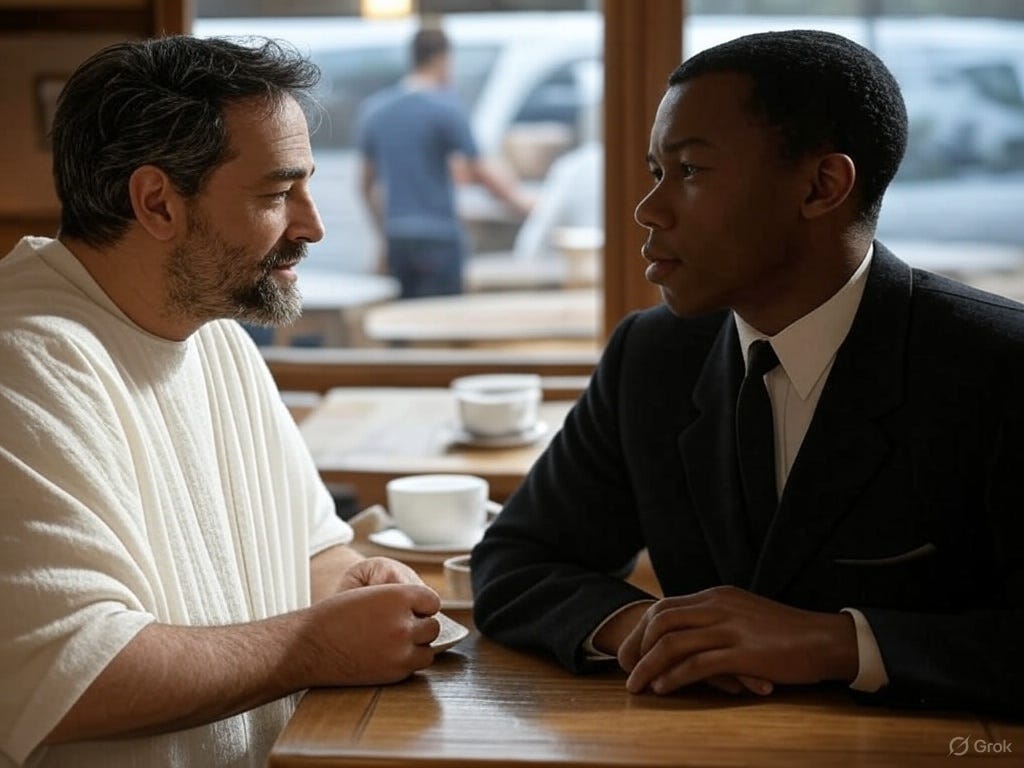Marcus Aurelius vs. Motown
Stay stoic or risk heartbreak?
Stoicism is a philosophical movement that claims to lead to happiness, to maximum human fulfillment. It is an approach that is advocated in contemporary books by corporate leaders, self-help gurus, and top military officers. By keeping one’s emotions in check and seeing the world from an objective point-of-view, we eliminate unnecessary suffering which opens the way to being a sage.
But a different approach came out of a school of American philosophers from Detroit in the 1960s. The Motown approach embraces human feelings, especially in cases of emotional conflict. Instead of taking the Stoics objective perspective, the Motown way allows for the complexity of subjectivity to be experienced.
The question is which of these makes us more human.
Philosophers on the Porch
In Greek, a “stoa” is the front porch of a house. A group of thinkers used to meet regularly on a stoa to discuss the proper way of being and thus became known as Stoics. The word “stoic” in contemporary parlance means someone with an even keel, someone who never gets excited in the face of positive or negative developments. Think of the strong, silent type, the sort often portrayed by Clint Eastwood. These two are connected.
The movement began in classical Athens but found its greatest advocates in Rome with Marcus Aurelius and Epictetus. While their philosophical writings were similar, they could not have been more different. Marcus Aurelius was an emperor while Epictetus was a slave. That these two should advocate the same way of living shows that the proper way of being should not have anything to do with the place you occupy or the life events you happen to live through.
No one was more privileged than Marcus Aurelius, yet he held that “that which is fortunate is not separated from nature” and that everything in nature flows from the providence of the gods. That he would occupy a place of great power was the result of the necessity of the gods’ plans, do not take it as evidence of his personal superiority. Keep your ego in check. You are a person and not a god.
While these events are beyond human control, there is one thing that is ours to determine: our reactions. In his masterwork The Enchiridion, Epictetus distinguishes between those things in our control, “opinion, pursuit, desire, and aversion,” as opposed to those which are not, “body, property, reputation, and command.” The events in the world may be beyond us, but we control how we respond to them.
To yearn for something you do not have, argued Epictetus who had been a slave and lost the use of a leg, will lead to suffering. The key to avoiding this agony is to align your mind with the natural flow of the world. Understand that what is must be, as it is the will of the gods, and the best mental stance is openness and acceptance. In the words of the great American Stoic Doris Day, “Que Será, Será, whatever will be, will be.”
It would be absurd for you to be sad that you were not born a giraffe. In the same way, it would be absurd for you to be happy or sad at anything that comes to be and the Stoic way is to prepare the mind to see everything not in terms of your own desires, but in terms of its necessity. With all things in life, you must detach from your emotional connection. One might say that stoicism is an anti-attachment philosophy. “If you like a clay pot,” Epictetus wrote, “consider ‘I like a clay pot’. So, if it is broken, you will not be disturbed. If you caress your child or wife, consider that you caress a human being. So, if they die, you will not be disturbed.”
We must reject seeing the world subjectively, that is, through our own eyes with our own feelings. Rather, we must embrace an objective perspective, live in a world of simple facts. This pot broke. That is true. Your child was killed. That is also true. By living objectively, unattached to what is beyond our control, we free ourselves from the pain that comes with misaligning our consciousness with reality. The sage allows the mind to flow in accord with the way things turn out.
You Better Shop Around
Image: Smokey Robinson, ar.inspiredpencil.com
Before you buy into Stoicism, let us consider the imperative of Smokey Robinson’s mother—because “there’s still some things that you don’t understand now…you better shop around.” In the lyrics of the great hits of the Motown stars, we see an approach to life that contrasts with that of the ancient Stoics. Attachment to others is central to life. Instead of adopting an objective worldview in which we release our desires and align our minds with what happens to be, the scholars of soul take us to a place where we embrace our emotionality.
Epictetus prepares his mind to let his wife go without emotion when facing her untimely death, yet when confronting the mere demise of a romantic relationship the Temptations ain’t too proud to beg. It may be the case that their beloved wants to leave them, but they refuse to let her go. Instead of disengaging from the desire, they lean into it despite the pain and humiliation it causes. “Let your friends laugh, even this I can stand,” but they only need to stand it because they refused to align themselves with the flow of the world.
So, too with Martha Reeves who when in love finds herself staring into space, tears all over her face. She could disengage and objectively see the object of her affection as useful as a mere clay pot, but instead, she clings to the subjective, despite the fact that she can’t explain or understand it as she never felt like this before. Instead of cold objectivity, instead her subjective experience is like a heat wave.
The Stoics would point to the Temptations begging as a lack of dignity and the Vandellas’ tears as unnecessary suffering. They would see the Four Tops’ condition of come a-running to their Sugar Pie Honey Bunch whenever she snaps her fingers because “there’s nothing I can do” as a rejection of the freedom that makes them humans.
The result of this does seem to be a decreased quality of life. Where the Stoic faces tragedy with a calm acceptance, the Temptations’ sorrow means that they become trapped in social expectations and have to hope for bad weather because they “want so badly to go outside,” but doing so would cause humiliation because their sorrow has led to tears, something deemed inappropriate for man and those tears they refuse to explain. Epictetus would not need an explanation, he would understand them as evidence of a mind misaligned.
But acceptance of this pain is necessary if the other side of the emotional 45 is to be experienced. It may be the case that when she leaves, the Temptations wish it would rain. But, then, when they are together those very same Temps “have sunshine on a cloudy day.” It is “with sweet love and devotion,” Marvin Gaye sang, that the emotions the Stoics want suppressed could be deeply touched and he would be able to experience “how sweet it is to be loved by you.”
The Same Old Song
So, when it comes to the complexity of emotional conflict should we accept the will of the Supreme and stop feeling in the name of Stoicism before it breaks your heart or keep the heart open to the pain just in case they come back in your arms again? Is the avoidance of suffering and the acceptance of fate the proper way to a happier life or should we side with both the Temptations and Lord Tennyson that “it is better to have loved and lost than never to have loved at all”? Should we hold onto objectivity and the calm it brings or surround ourselves with our subjectivity and its emotional roller coaster? Are the unnecessary tears of a clown a price worth paying? Marcus Aurelius says no, Motown sang yes.








I'm going to reject this "either–or" paradigm. Life is not so neatly divided. The way out of this dilemma is to embrace both approaches. There is a time to feel all the feels because it is unhealthy to suppress them. And there is a time to step outside and realize that better days and things can be ahead if you can let go of your attachment to what you no longer have. Embrace paradox because that is what it is all about.